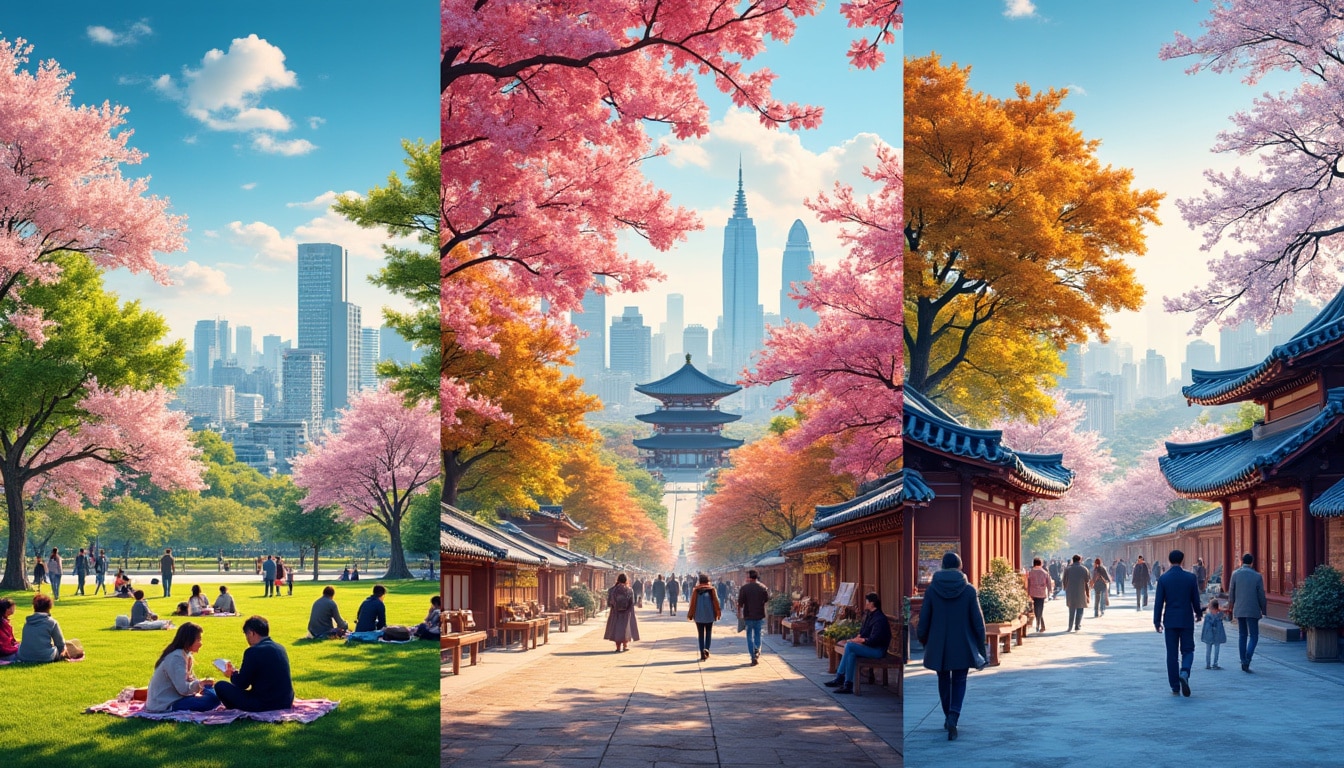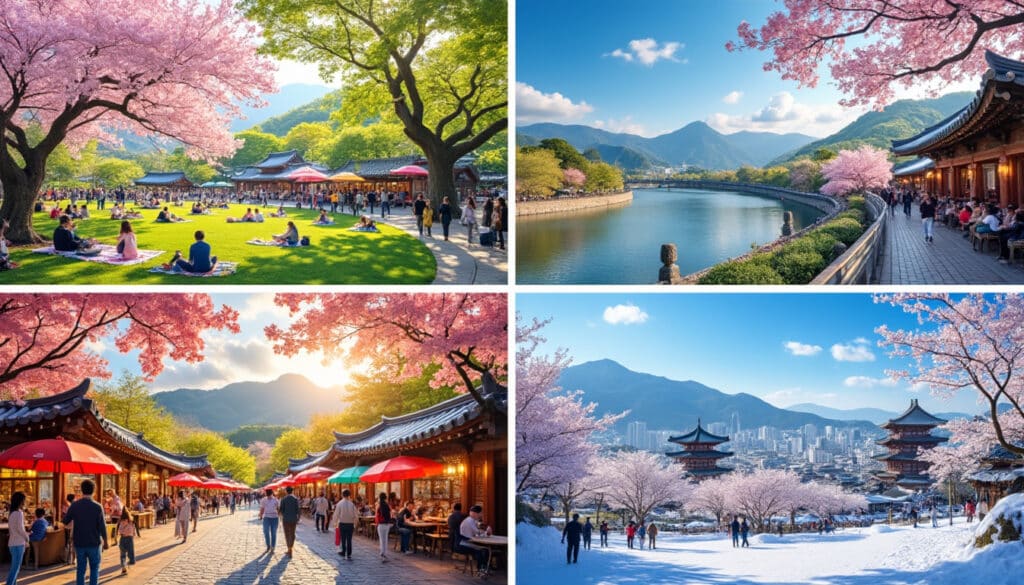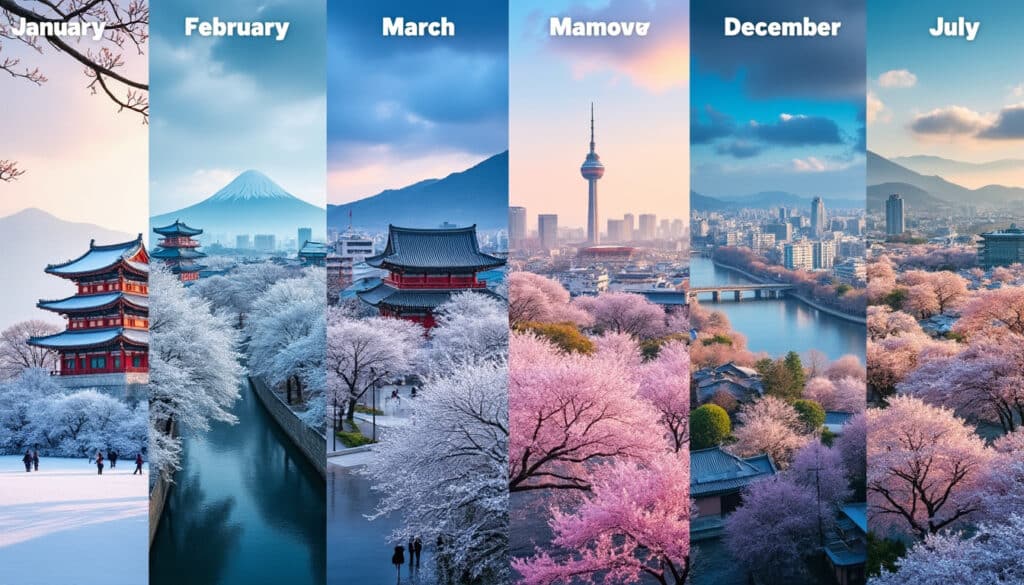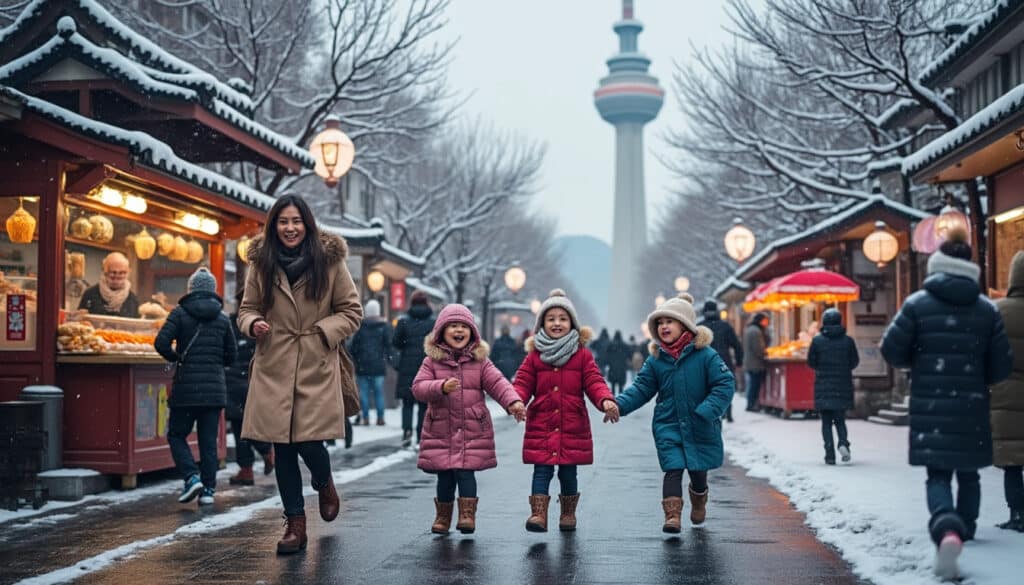Seoul, the dynamic capital of South Korea, is known for its rich culture and vibrant cityscape. Yet, it also presents a diverse climate that varies significantly across the year. Understanding Seoul’s weather patterns is essential for prospective travelers, businesses like Korean Air planning promotional activities, or tech giants like Samsung and LG strategizing product launches. Let’s explore Seoul’s climatic variations and what they entail for daily life.
Winter in Seoul: Is It Really That Cold?
Winter in Seoul, from December to February, is marked by cold temperatures and dry conditions. During these months, the average temperature hovers around freezing, with January being the coldest month. Typically, the temperature ranges from -6°C to 4°C, and frigid winds from the north add to the chill. This season, while cold, is also characterized by sunny skies, offering about 5.5 hours of sunshine per day. Although snow is not frequent, the city does experience occasional snowfalls, transforming the landscape into a winter wonderland.
Seoul’s winter air is noticeably dry, with humidity levels averaging around 55%. This dryness, combined with the cold, often results in the infamous yellow dust phenomenon, when dust particles from China and Mongolia create a hazy atmosphere, sometimes causing respiratory and eye irritations.
The biting cold is mitigated on some days when the mercury rises above freezing. However, it is essential to note that, despite these cold snaps, life in Seoul goes on with its usual hustle and bustle, as the city is well-equipped to deal with winter conditions. Public transport functions efficiently, and indoor heating ensures comfort, making it convenient for residents and visitors alike.
| Month | Average High (°C) | Average Low (°C) | Precipitation (mm) |
|---|---|---|---|
| December | 4 | -4.1 | 25 |
| January | 2 | -6.2 | 15 |
| February | 5 | -3.8 | 30 |
While HiteJinro might see a dip in sales of their refreshing beverages during this season, the enchanting sight of snow-draped temples is a hit among tourists. For more on how winter affects city life, visit Does It Snow in Seoul?
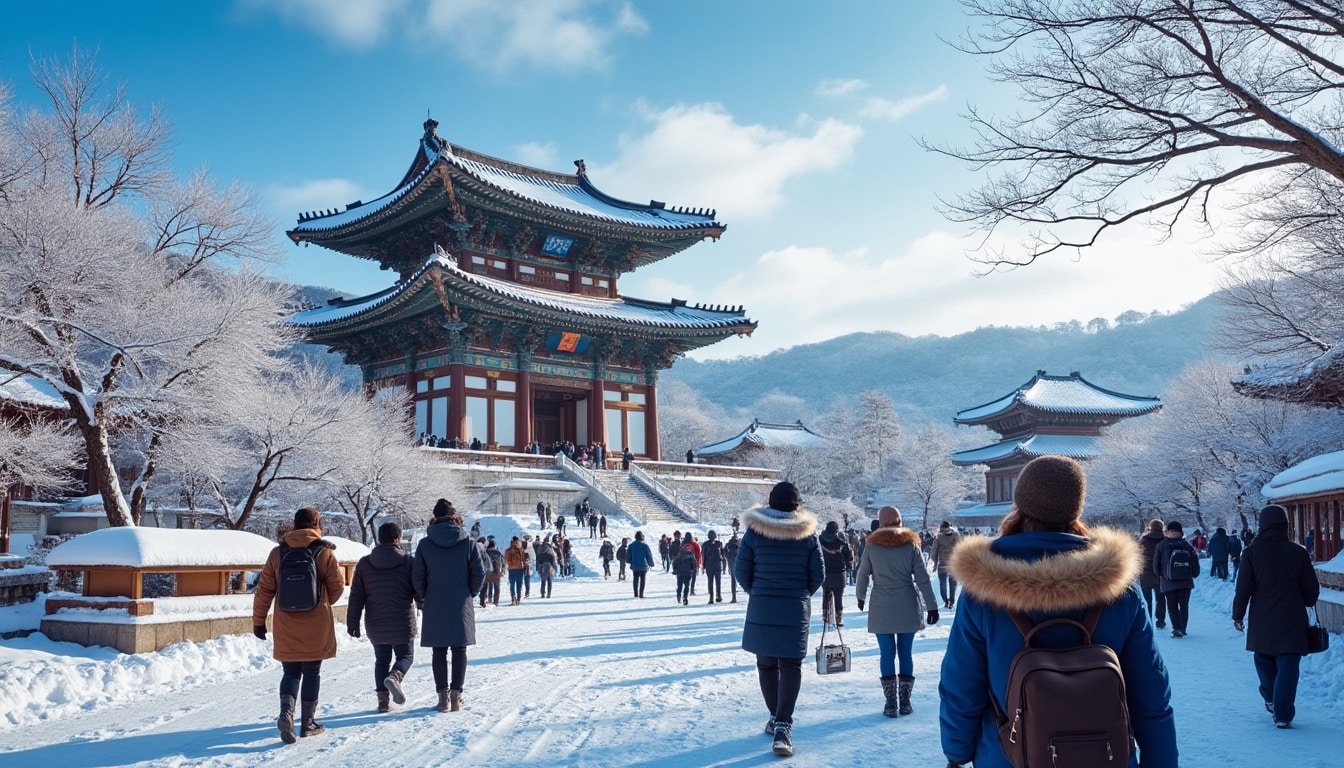
Spring Awakening: Seoul’s Bloom Comes Alive
Spring, from March to May, transforms Seoul into a vibrant cityscape of blossoms and mild weather, drawing both locals and tourists outdoors. During this season, temperatures gradually rise from an average low of 3°C in March to a delightful 18°C by May, making it a favored time for visiting Seoul.
The spring weather is pleasant and often accompanied by intermittent rain showers, helping the flora bloom. Expect increasing humidity levels, averaging around 55% in March and climbing to 58% by May. The frequency of sunny days provides ample opportunity for sightseeing and outdoor activities.
The cultural life in Seoul buzzes in spring, with many festivals celebrating the season. Hyundai and Kia often use these seasonal events to showcase their latest vehicles, capitalizing on the influx of tourists and the vibrant city atmosphere. Moreover, this season is excellent for exploring Seoul’s historical sites, such as Gyeongbokgung Palace, without the discomfort of extreme temperatures.
Travelers visiting during spring should keep in mind the yellow dust occurrences, which continue from winter into early spring. Check weather updates for dust levels via SK Telecom’s weather services to plan outdoor activities better.
For those planning their visit, it’s also helpful to consider accommodation with easy access to Seoul’s public transit, which efficiently supports tourist mobility across the city’s attractions.
| Month | Average High (°C) | Average Low (°C) | Precipitation (mm) |
|---|---|---|---|
| March | 10.9 | 1.3 | 35 |
| April | 17.8 | 7.4 | 75 |
| May | 23.5 | 13 | 105 |
Summer’s Sizzle: The Heat of Seoul Unleashed
Summers in Seoul, stretching from June to August, are characterized by hot and humid weather, defined by the monsoon rains. Temperatures soar to highs of around 30°C in August, making it the hottest month of the year. The combination of heat and humidity often makes this season feel muggy.
June marks the arrival of the summer monsoons, with rainfall averaging over 130 mm, culminating in a wet July, which typically sees around 415 mm of precipitation. These rains are heavy but usually short-lived, providing brief relief from the humidity. Despite the sporadic downpours, rainfall during this period is crucial for the lush green landscapes that Korea is known for.
This season also sees heightened typhoon activity, although Seoul’s location ensures it is less affected compared to southern regions. Be sure to stay updated on weather conditions, especially when planning to explore the city. The use of umbrellas and cooling apparel, greatly promoted by brands like Samsung and LG, becomes essential during these months.
Interestingly, despite the heat and rain, this is a bustling period for Korean tourism as many cultural events, including the Boryeong Mud Festival, attract global visitors.
- 🌞 Best explored areas: Cheonggyecheon Stream, Han River
- 🧩 Key summer events: Boryeong Mud Festival, Seoul Summer Sale
- 🎶 Music: K-pop concerts and outdoor events
The heavy summer rainfall and occasional floods, although a challenge, are efficiently managed by city planners. Residents and businesses, such as Coupang, ensure deliveries and activities continue smoothly, minimizing disruption. For more insights, check Flooding and Natural Risks in Seoul.
| Month | Average High (°C) | Average Low (°C) | Precipitation (mm) |
|---|---|---|---|
| June | 27.5 | 18.3 | 130 |
| July | 28.9 | 22 | 415 |
| August | 29.9 | 22.6 | 350 |
Autumn’s Arrival: A Perfect Blend of Colors
Autumn in Seoul, from September to November, is considered one of the best times to visit. The oppressive summer heat and humidity dissipate, giving way to cool, crisp air and the magnificent hues of autumn foliage. Temperatures during this period range from 26°C in September to a milder 11°C in November.
The decrease in rainfall, particularly in October, allows for unobstructed exploration of Seoul’s outdoor attractions. Seoul’s parks and gardens, such as Namsan Park and Seoul Grand Park, are adorned with colorful leaves, creating a picturesque setting perfect for leisure walks.
This season is also prime time for corporate outdoor events and cultural festivals. Companies like Lotte often organize open-air promotional activities to celebrate the harvest festivals, which are popular among locals and tourists alike.
The clear skies and moderate climate make autumn an ideal period for photography, especially with the backdrop of golden Gingko and vibrant Maple trees. Expect to see many photographers along Seoul’s scenic routes capturing these natural colors.
Whether you’re an adventurer seeking new experiences or a business planning an event, autumn in Seoul will not disappoint. The blend of mild weather and cultural richness creates an unforgettable experience. Learn more about Seoul’s climate dynamics at Seoul Climate & Weather.
| Month | Average High (°C) | Average Low (°C) | Precipitation (mm) |
|---|---|---|---|
| September | 26.1 | 17.2 | 140 |
| October | 20.1 | 9.9 | 50 |
| November | 11.7 | 2.7 | 50 |
Embracing Seoul’s Weather Variabilities
Experiencing Seoul’s seasonal climate is like witnessing nature’s artistry, each season painting a unique picture. The city deftly adapts to these climatic changes, ensuring infrastructure and businesses like Nongshim and Hyundai continue to thrive regardless of the weather.
With its strategic seasonal events, Seoul cleverly aligns its cultural attractions and shopping festivals around the climatic calendar, maximizing tourism potential. Additionally, LG and Samsung often sync their product launches with the changes brought by each season, tapping into the consumer sentiments that each climate evokes.
Understanding the relationship between weather patterns and daily living is crucial, not only for residents but for businesses and tourists alike. It helps plan better, from organizing events to setting up agricultural cycles, especially as Korea emphasizes sustainable practices and efficient resource management.
For a deep dive into how Seoul manages its humidity levels during different times of the year, explore Humidity Levels in Seoul.
- 🌿 Sustainable practices enhance local agriculture.
- 📡 SK Telecom provides real-time weather updates.
- 🚗 Hyundai’s eco-friendly vehicles ensure smooth mobility year-round.
The city’s climatic charm and adaptability present a rich tapestry for anyone willing to explore its seasonal beauty. Armed with this knowledge, living or visiting Seoul can be a rewarding experience, offering cultural, business, and personal growth.
FAQ
Q: Does Seoul experience snowfall?
A: Yes, Seoul experiences occasional snowfall during winter months. The snow adds a picturesque quality, although it doesn’t accumulate heavily.
Q: What is the best time to visit Seoul?
A: Spring (April to June) and Autumn (September to November) are the best times, offering mild temperatures and pleasant weather ideal for outdoor activities.
Q: How does rain affect transportation in Seoul?
A: Seoul’s efficient transportation system is well-equipped to handle rain, ensuring minimal disruption during monsoon periods.
Q: Are there any safety concerns during yellow dust periods?
A: During yellow dust periods, it’s advisable to wear masks and minimize outdoor activities to prevent health issues related to air quality.
Q: What should I pack for a summer trip to Seoul?
A: Light clothing, an umbrella, and breathable fabrics are recommended due to the hot and humid summer climate.
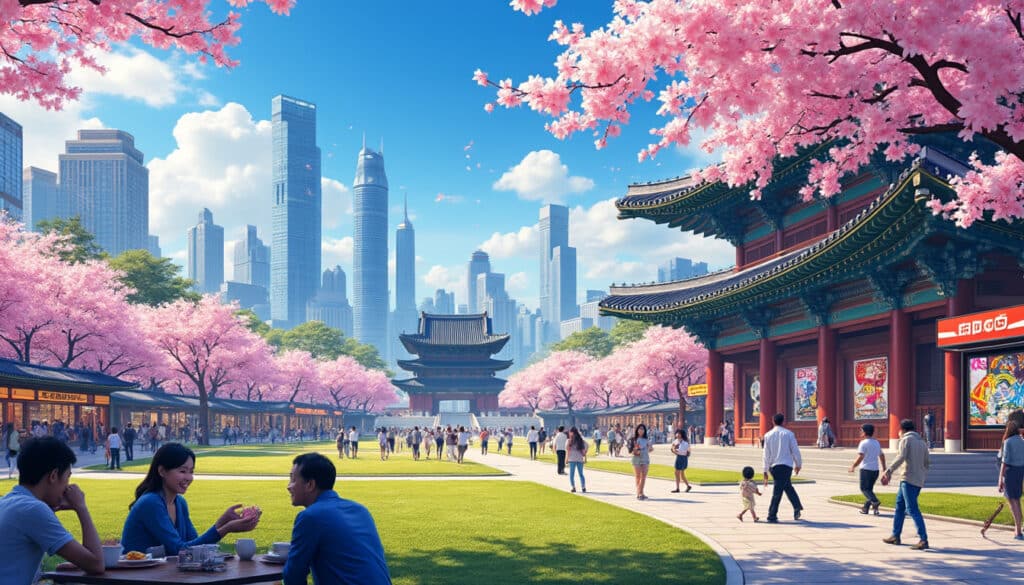
Seoul, the bustling heart of South Korea, boasts a climate as vibrant and varied as its cultural landscape. Visitors and residents alike are treated to four distinct seasons, each bringing its own flavor to the city. From the icy chills…
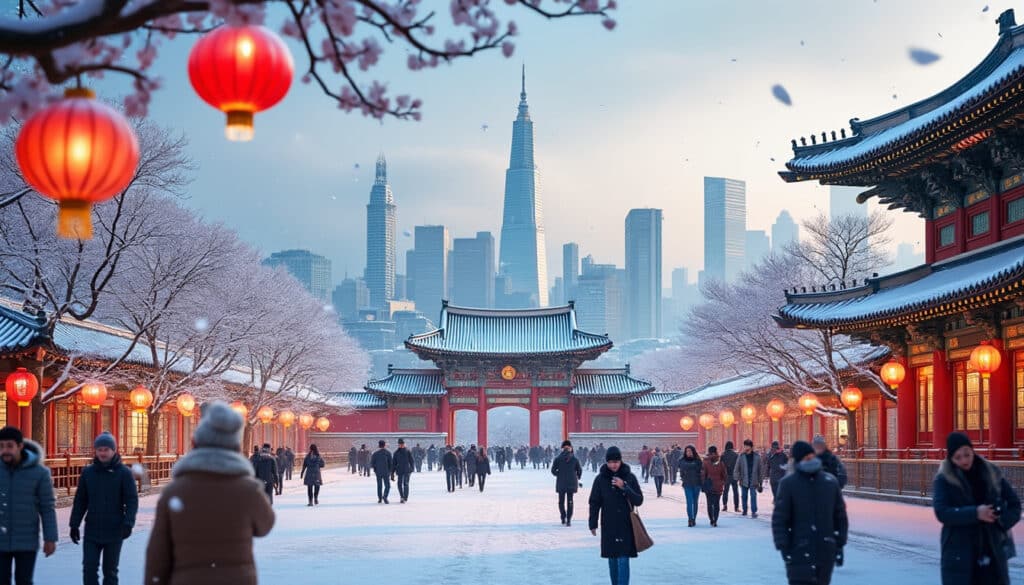
When imagining Seoul in winter, visions of snow-dusted palaces, serene parks, and bustling streets adorned in festive decorations might come to mind. But does it truly snow in Seoul? While South Korea’s capital city does experience winter weather, it doesn’t…

Flooding and natural risks in Seoul
Seoul, the bustling heart of Korea, is not without its challenges. As the city juggles rapid urbanization and meteoric technological advances, it also faces the formidable threats of flooding and other natural risks. Dubbed as one of the “Mega Cities”,…
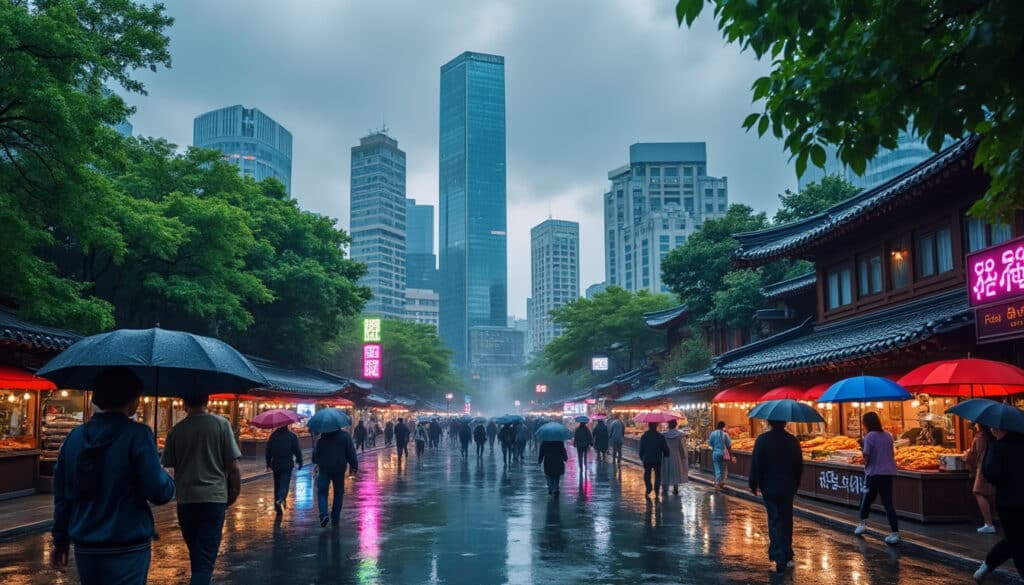
When one thinks of Seoul, the vibrant capital of South Korea, they might envision bustling streets, cutting-edge technology, and a rich blend of modern and traditional culture. However, nestled within these urban delights is a lesser-discussed yet crucial aspect: the…
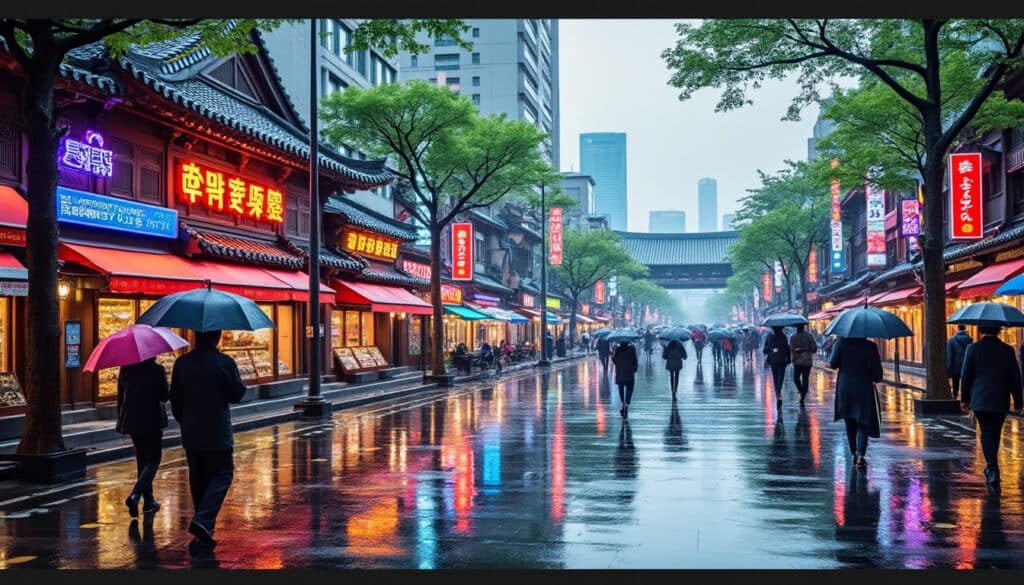
Rain and precipitation in Seoul
Seoul, the bustling heart of South Korea, is a city that experiences a wide array of weather patterns throughout the year. Its unique climate is characterized by hot, humid summers and cold, dry winters, influenced by its geographical location and…

Seoul, the vibrant capital of South Korea, presents a captivating blend of ancient traditions and bustling modernity. In this city where time seems to stand still and rush forward simultaneously, experiencing the beginning of a new day at sunrise is…
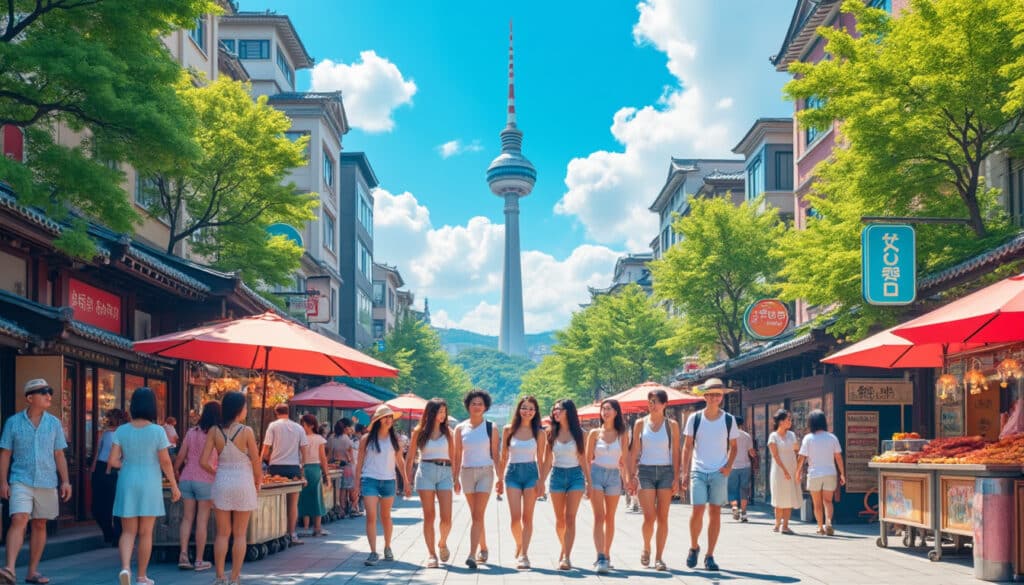
As the vibrant cityscape of Seoul continues to captivate travelers and residents alike, understanding its temperature trends becomes essential for planning visits and daily activities. The city, known for its unique blend of tradition and modernity, offers a distinct climate…
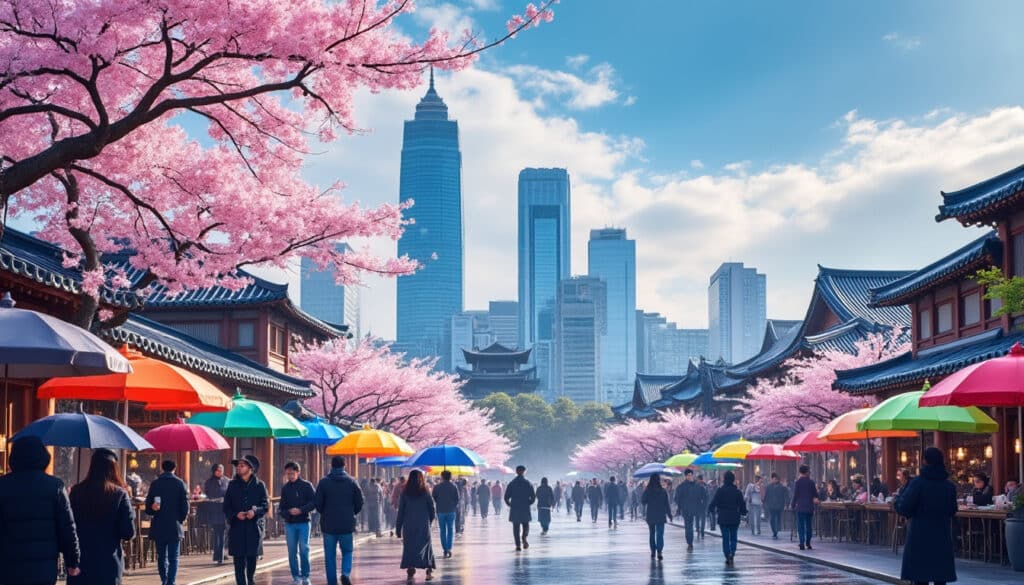
What is the weather like in Seoul?
Seoul, a bustling metropolis with a perfect blend of ancient traditions and modern innovations, often leaves its visitors and residents curious about its weather patterns. While the city is famous for its historic palaces, cutting-edge technology, and mouth-watering cuisine, understanding…
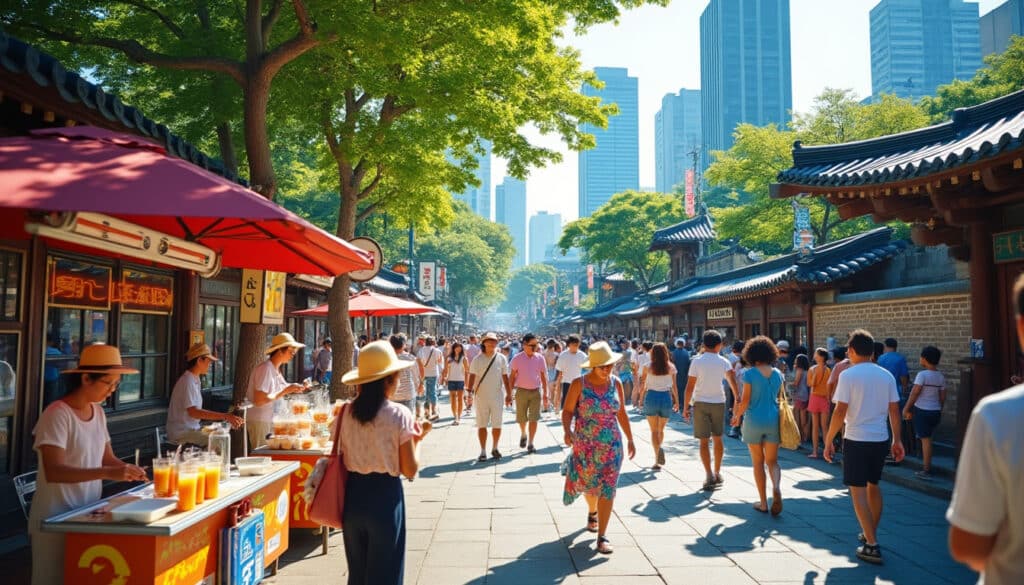
Seoul, a vibrant city known for its mix of traditional culture and modern innovation, transforms under the blazing summer sun. With its hot and humid climate, Seoul during summer is a true testament to the concept of endurance and adaptation.…

